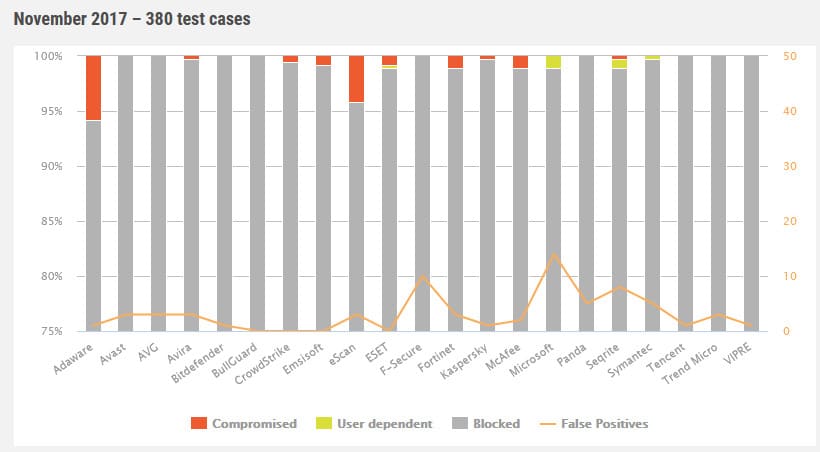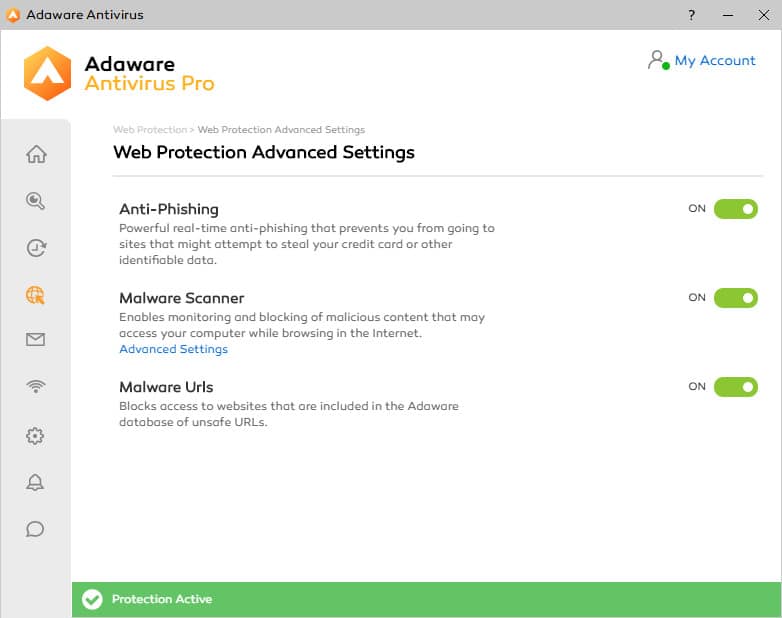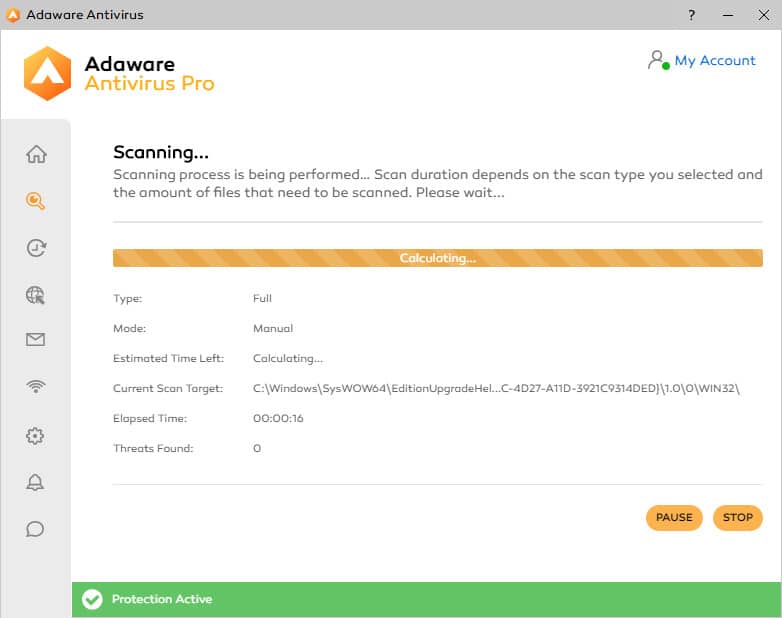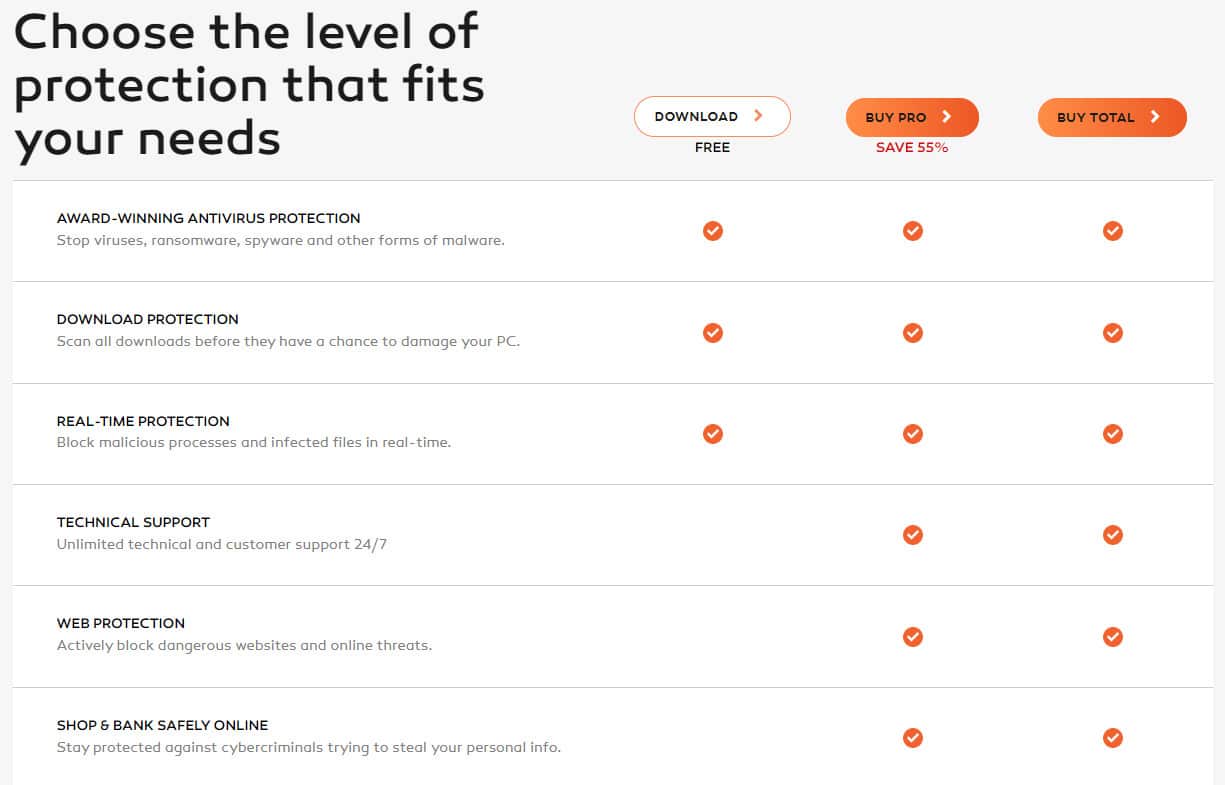
In this review, I want to discuss how well Adaware functions for ordinary home PC users, as well as how effectively it protects them against malware and virus threats.
To do this, this Adaware antivirus review will answer the following questions:
- How much does Adaware antivirus cost?
- What features does Adaware offer?
- How effective is Adaware against malware?
- How does it affect PC performance?
I considered all of these factors when deciding if Adaware’s programs are worth downloading. Before I break down my findings, here is a short summary of what I found about Adaware’s antivirus products.
Adaware review summary
Adaware is priced the same as many of the biggest names in the antivirus world, despite offering less for money. The malware tests, both internally and externally, returned mixed results, and this isn’t something you want to see from a privacy tool.
There are some system slowdown issues too, which can be a cause of frustration. Although Adaware does have a few extra features, it’s not an antivirus I can recommend to our readers, and it’s worth looking elsewhere.
TRY OUR HIGHEST-RATED ANTIVIRUS RISK-FREE
Norton is our highest-rated antivirus software and is offering a completely free 7-day trial. This is a great way to try the service before subscribing.
After your trial, you can get huge discounts including up 83% off your first year of Norton Antivirus Plus.
Pros
- Offers a free version
- Parental controls
- Phishing protection
Cons
- Limited independent testing results
- Mediocre performance in speed tests
- Lack of transparency on how deep scans go
What versions of the software are available?
Adaware Antivirus
Adaware’s free antivirus safeguards your computer from online threats so you can focus on using your PC for the things that matter without worrying about dangerous malware and other online threats. Adaware Antivirus for Windows allows you to schedule daily scans, get real-time security, eliminate suspicious activities, amongst many other features to keep your Windows devices safe.
The free version includes protection against ransomware and spyware plus download protection to scan all files in real-time before they have a chance to damage your PC.
Adaware Antivirus Pro
Adaware Antivirus Pro has all of the capabilities of the free version as well as a comprehensive line of protection against hackers, cyber dangers, and malware. It promises to have new threat detection driven by powerful anti-malware technology that will identify and remove any risks on your PC. This plan also includes unlimited technical and customer assistance 24 hours a day, seven days a week. You will also get web security, which will actively prevent access to risky websites and online threats.
There is a tool to help you shop and bank securely online and stop hackers from stealing your personal information such as names, addresses, dates of birth, and payment information. The firewall shield guards against hackers and network breaches. Email protection and powerful antispam filters with real-time email protection are also included, as are parental controls and network protection.
Adaware Antivirus Total
Adware Antivirus Total is the top-tier product in the Adaware lineup. It, too, prevents malware and has all of the capabilities stated in the preceding levels. It also includes a utility for optimizing and speeding up your computer. This will aid in the repair of your PC’s issues and shorten startup times. This version helps safeguard your privacy by removing trackers and erasing hidden activity data. By eliminating unneeded trash files, erasing duplicates, and freeing up disk space, you may use the program to address problems in the Windows OS automatically, increase available memory, and optimize disk space.
Is Adaware Antivirus effective against malware?
Malware, viruses, trojans, and worms are among the risks that fall under the malware umbrella, and you need a tool that can stop any of these assaults against your device before it can cause serious damage.
Real-time scanning tests
Using the European Institute for Computer Anti-Virus Research (EICAR) sample files, I’ll check how fast Adaware is able to detect and remove malware threats. Ideally, I want to have the real-time scanner recognize the files as a danger and prevent them as soon as they’ve been downloaded for this test.
A viral assault may take a variety of forms, and these four sample files mimic those threats.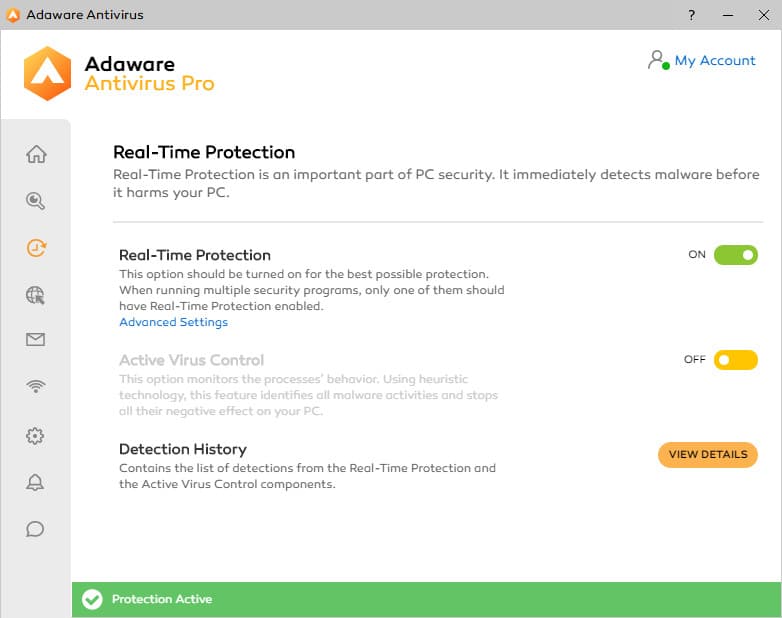
The first file is made up entirely of ASCII characters. The second file, eicar.com.txt, is a duplicate of the first but with a different name. I copy this text, paste it into Wordpad on my computer, then save the file to check whether the malware scanner finds it. The third test file is included inside a zip folder, which adds a layer of complexity for the antivirus scanner, but it is also a realistic scenario that it should be able to handle. A virus contained inside a compressed file will be detected by a good anti-virus scanner. The virus sample file is included in the final Eicar test file, which is a zip bundle. This file may be used to see whether the virus scanner searches compressed directories with more than one degree of compression.
I’m curious to see whether the software can distinguish and block the samples, and if so, how. The following table summarizes Adaware’s findings:
| No value | Adaware |
| Website | adaware.com/ | Eicar Sample 1 | Allowed | Eicar Sample 2 | Allowed | Eicar Sample 3 | Blocked | Eicar Sample 4 | Blocked |
|---|---|
| Best deal (per month) | $2.49 SAVE 55% on a 1 year plan |
What this table means is that Adaware identified failed to block the first two EICAR files (the ASC11 string files) but it did detect the two EICAR files inside the zip folders with the real-timescanner.
To check how well the software’s real-time scanner functioned, I ran it against some actual malware files. These live samples include hazardous applications such as trojans and adware.
Adaware performed well here, blocking the two trojan files and one adware file I tried to download, with its real-time scanner quickly detecting and quarantining the files.
This table summarizes how it fared:
| No value | Adaware |
| Website | adaware.com/ | Live Sample 1 (Adware) | Blocked | Live Sample 2 (Trojan) | Blocked | Live Sample 3 (Trojan) | Blocked |
|---|---|
| Best deal (per month) | $2.49 SAVE 55% on a 1 year plan |
Overall I was quite impressed with the speed and effectiveness of the Adaware real-time scanner in my own tests, though of course I would have preferred it to pick up the two EICAR text files too.
On-demand scanning tests
Next I wanted to test how well the on-demand scanner included with the Adaware suite dealt with the virus and malware files. To do this I turned off the live scanning function from the Adaware dashboard. From here I downloaded all four EICAR files and the three live samples without the program blocking the download attempt. Now with them on my local drive, I ran a quick scan.
The quick scan took 1 minute 46 scan time (106 seconds) to complete and no files were found. and failed to pick up any of the files.
Next, I ran the full scan. Again, this was quite short and only lasted nine minutes and 59 seconds, which is shorter than many other full scans I’ve recorded from other providers, and the Adaware interface did not disclose how many items were checked in that scan time.
Despite this, Adaware did manage to find the live malware files and strangely the on-demand scan even found the ASCII files that its real-time scanner missed.
The table below compares the length of time of a full scan against many other providers I’ve tested.
| No value | Adaware | Kaspersky | Norton | ESET | Avast | McAfee |
| Website | adaware.com/ | kaspersky.com | Norton.com | eset.com | avast.com | mcafee.com | Full Scan Time (minutes) | 10 | 227 | 121 | 68 | 60 | 223 | Number of scanned objects | Unknown | 2100000 | 1,420,276 | 930,000 | 1870000 | 785000 |
|---|---|---|---|---|---|---|
| Best deal (per month) | $2.49 SAVE 55% on a 1 year plan | $2.49 GET 70% OFF | $3.33 GET 57% off the first year! | $4.99 50% off all ESET Home Security products! | $2.10 Holiday SALE! Save up to 65% | $3.33 SAVE $80 on a 2 year plan - 5 devices |
Adaware’s scan did perform well but it would be nice to see how many items it checks.
Independent lab testing results
I want to see how the latest results from leading independent test labs AV-Comparatives and AV-Test compare to my own test data.
The labs provide large scale tests against hundreds of samples including zero-day threats, providing a broader indication of how good the software is.
The latest tests for Adaware are available from November 2017 so while not the most up-to-date results they should at least provide an indication of how the underlying software and malware scanning engine performs at scale. The AV-test results available are from 2013 and under the brands previous name, (Lavasoft) so they will be omitted from this review.
AV-Comparatives
In the Real-World Protection Test for Enterprise performed monthly between July-November 2017 Adaware was tested alongside a number of other providers. In the November test it faced 380 malware test cases. The software managed to protect against 94.2 percent of the threats in the test. These results ranked Adaware in last place compared to the other 20 AV products tested at the same time against the same malware samples. In the test Adaware scored one false positive. It’s worth noting that in the previous month of testing in October 2017, Adaware scored 98.1 percent protection, while in September it scored 93.5 percent protection. It seems its success against malware is inconsistent and leaves users vulnerable to some attacks.
Adaware features
Adaware antivirus comes with a number of different reasons, below is an overview of some of the best ones.
Parental controls
The Parental Control function (available exclusively in the Total edition) is a helpful online filtering option for parents who want to safeguard their children at home from unsuitable or adult websites by putting content limits in place.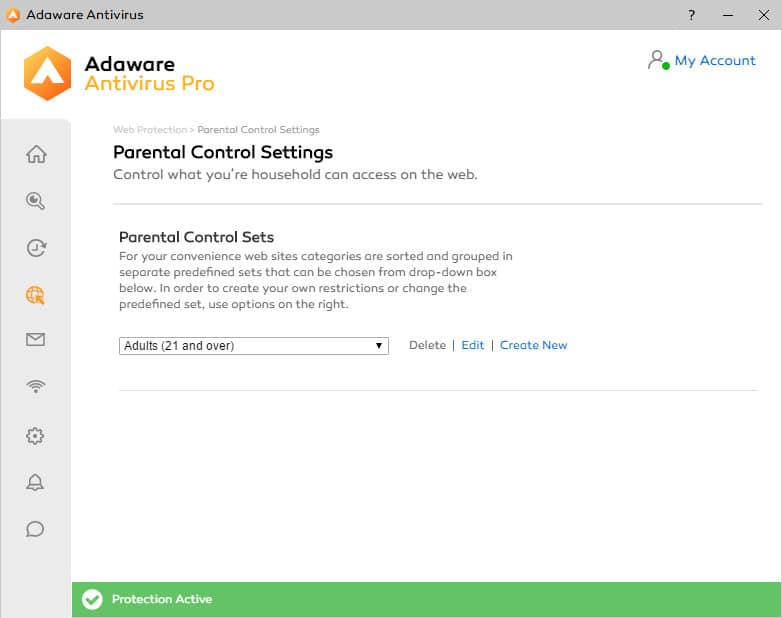
The Parental Control option is deactivated by default, so you’ll have to enable it yourself. It’s easy to do with a single click on the slider to enable the feature in the Adaware interface. Follow the instructions below to activate the Parental Control feature:
To access the Parental Control feature’s configuration choices, select the Advanced Settings link and specify the restrictions and limitations you wish to apply. Parental Controls in Adaware are an extension of the Web Protection function that enables parents to filter internet material based on their child’s age and specific requirements. Parents may utilize a categorized list to access pre-defined groupings of forbidden websites depending on their child’s age range. Parents may also design their own categories of websites to ban and use a custom filter to do so.
Shop & bank safely online
A feature for safe online shopping and banking is available in Adaware Pro and Adaware Total. It’s a real-time web filter that should protect you by analyzing links on web pages, in emails and in messages.
The web is the number one source of malware and threats which get more varied and sophisticated every day and this feature helps you stay protected against cybercriminals trying to steal your personal info.
It works by scanning and analyzing both the content and attachments of incoming emails to eliminate email borne threats. While surfing the web via your browser this feature protects you by intercepting and blocking access to known bad URLs and websites meaning you are less likely to be tricked by a phishing site and enter your personal and payment details to a fraudulent site. The tool informs you if the site you’re attempting to visit is suspected of phishing or malware distribution in real-time adding an extra layer of security to your web browser’s built-in protections. The Web Protection function searches numerous databases for the most recent phishing and malware connections, ensuring that users are protected against the most recent online dangers and making the internet safer.
Smart scan technology
Adaware includes a built-in smart scan technology that checks previously-scanned files with less frequency to conserve system resources. This feature allows you to keep an eye on your Windows device and take immediate action in the case where your computer is at risk of a malicious attack, while in theory allowing the software to run quicker scans that have less impact on the PC.
What is Adaware’s impact on performance?
To assess how much the antivirus program affected PC performance, I ran a quick scan and full scan. I used the Windows utility to check how much of the system’s resources were being utilized before a scan so I could observe the impact on CPU, memory, and disk utilization when the quick scan and full scan were running.
The control numbers below show system resource usage before the scan was launched, and then those recorded during the quick scan.
| No value | Adaware |
| Website | adaware.com/ | Control CPU Utliization % (no scan) | 5 | Control Memory Utilization % (no scan) | N/A | Control Disk Utilization (seconds) (no scan) | 3 | Quick Scan Time (seconds) | 106 | Quick Scan Memory Utilization % | N/A | Quick Scan Disk Utilization (seconds) | N/A |
|---|---|
| Best deal (per month) | $2.49 SAVE 55% on a 1 year plan |
As we can see, the CPU utilization increased by 73 percent during the quick scan, and disk utilization jumped from three MB/s to 12 MB/s. The Windows utility on the remote server I used for this test failed to capture memory utilization so we can’t see how that was impacted. The quick scan only lasted for 106 seconds so, even though the increases were large, it shouldn’t impact the user too much.
Adaware’s quick scan length seemed to be in line with some of the other major anti virus brands I have tested such as Norton and Bitdefender, though it is maybe slightly on the shorter side.
| No value | Kaspersky | Norton | ESET | Bitdefender | Avast | McAfee | Adaware |
| Website | kaspersky.com | Norton.com | eset.com | Bitdefender.com | avast.com | mcafee.com | adaware.com/ | Quick Scan Time (seconds) | 273 | 171 | N/A | 338 | 64 | 633 | 106 |
|---|---|---|---|---|---|---|---|
| Best deal (per month) | $2.49 GET 70% OFF | $3.33 GET 57% off the first year! | $4.99 50% off all ESET Home Security products! | $4.16 Get 50% OFF! | $2.10 Holiday SALE! Save up to 65% | $3.33 SAVE $80 on a 2 year plan - 5 devices | $2.49 SAVE 55% on a 1 year plan |
Full Scan
Next let’s look at how the full on-demand scan impacted my computer’s performance. The table below shows the results recorded before and during the full system check performed by Adaware.
| No value | Adaware |
| Website | adaware.com/ | Full Scan CPU Utilization % | 78 | Full Scan Memory Utilization % | N/A | Full Scan Disk Utilization (seconds) | 867 | Full Scan Time (minutes) | 10 | Control CPU Utliization % (no scan) | 5 | Control Memory Utilization % (no scan) | N/A | Control Disk Utilization (seconds) (no scan) | 3 |
|---|---|
| Best deal (per month) | $2.49 SAVE 55% on a 1 year plan |
As we can see, the CPU utilization increased from five percent to 73 percent during the full scan, while disk utilization also recorded a significant jump from 3 MB/s to 867 MB/s.
Overall this seems to indicate a reasonable impact on system resources especially during the full scan. It’s a ten minute scan so during that time perhaps users would see a slow down in certain processes such as downloading and installing apps or launching files, while the scan continues to run in the background.
As with the malware protection tests, I looked at the results of the independent AV testing labs to see if the results were in line with my own test data.
AV-Comparatives runs a performance test to see how well AV programs run in the background and how they impact a user from running simple everyday computing tasks. Taking these tests as reference, users can evaluate their anti-virus protection in terms of system speed (system performance).
The following tasks were evaluated by the lab:
- Downloading files
- Browsing websites
- File Copying: first and subsequent run
- Installing and uninstalling applications
- Archiving and unarchiving
- Launching applications: first and subsequent run
The most recent data on PC performance featuring Adaware was collected in October 2017. For downloading files, and for file copying on the first and second run Adaware was rated as slow. For browsing websites and installing and uninstalling applications Adaware was rated as mediocre. For archiving and launching apps and the first and subsequent run Adaware was rated as very fast.
Overall these results backup my own: Adaware does have some impact on PC speed during scans.
Is the interface easy to use?
Adaware’s style and layout is pretty standard for a modern UI, and it is practical and simple to use. The main features and important information is clearly listed in the main panel and a list of additional tools are available in a list down the left hand side, each with its own icon. From the UI, you can do a fast, full, or custom scan, as well as execute product updates and verify that you have the most recent version of the program. If you are using the free version, or the Pro version you can also upgrade by clicking on the link in the dashboard.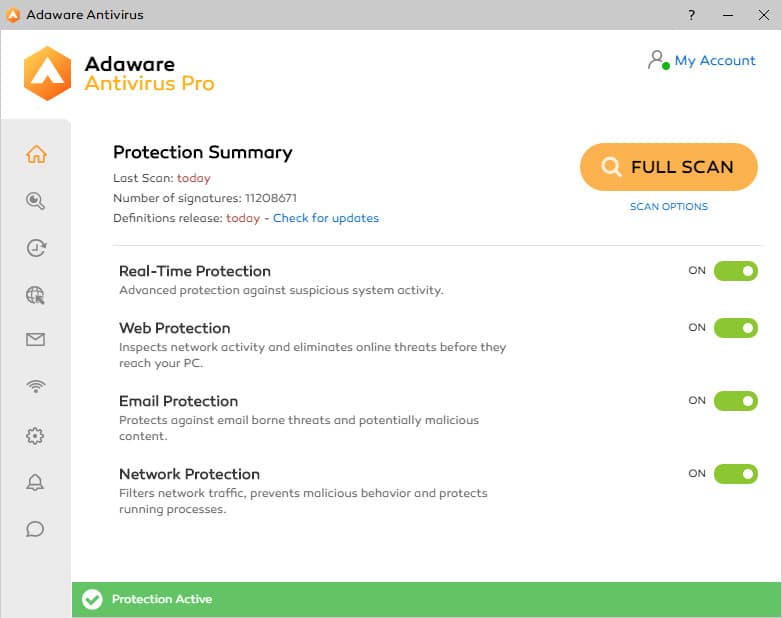
The user interface will also provide you with a clear notice indicating if your system is safe or not, and whether you need to take any action to correct it.
Adaware customer support
Adaware has a really good FAQ with lots of helpful articles for each product clearly divided into separate sections.
There’s a live chatbot assistant, and you can also email support with any questions you have. There’s also a community section on the Adaware website so you can get support and advice from fellow users.
Adaware does lack a live chat function that lets you talk with a human representative and while there’s also no mention of a phone number for technical assistance on the support pages, I did see one listed for support on the checkout page when I downloaded the software.
Compatibility
Adaware is compatible with Windows-based computers. Check the list below to discover whether your operating system has been tested as compatible with Adaware. Adaware also needs an active internet connection to keep current with the most recent threat detection.
- Windows 10
- Windows 8, 8.1
- Windows 7
The latest version of Adaware Antivirus allows users to experience effortless security. Automatic updates and real-time protection let you enjoy an uninterrupted online experience.
Minimum requirements:
- 4.5 or higher version of Microsoft Windows Installer is required for installation of Adaware Antivirus.
- 1.8 GB available free hard disk space (at least 800 MB on the system drive)
- 1.6 MHz processor
- 1 GB of memory (RAM)
Adaware pricing
Adaware offers free antivirus software that can be downloaded from the company website and free of charge. The free version includes real-time scanning capabilities but not as many features.
Adaware Antivirus Pro
Adaware Antivirus Pro costs $29.99 per year to protect one device for the first year. If you want to protect more devices there is an option to add protection for up to five devices for another $9.99 per year. That brings the total to $39.98 per year.
Adaware also offers the option to add a VPN to its Antivirus Pro subscription and this costs $20 per year for new subscribers.
Adaware Antivirus Total
Adaware Antivirus Total costs $89.99 per year for a single device. Again, to protect five devices it costs an additional $9.99 bringing the total to $99.98 per year. The VPN can again be added to this package for $20.00 per year for first-time users.
Best Adaware alternatives
If you are looking for a new antivirus it is worth comparing a variety of options to find the best option for you. I have listed a few of the best alternatives to Adaware below that offer a good balance between price, high malware protection ratings, and a number of security and privacy tools.
McAfee: McAfee’s defense against real-world threats is rated as close to 100 percent in recent lab results. It has a powerful malware scanner and has performed well in both my own tests and those conducted by reputable testing organizations. It also comes with a variety of other features that may help you improve your online security and privacy.
Bitdefender: For home users, Bitdefender Total Security offers a fair balance of price, malware prevention methods, and a number of useful privacy features. Bitdefender also fared well in my tests as well as those conducted by the most reputable independent testing organizations.
Avira: Avira offers customers effective and strong antivirus protection. I recommend Avira’s Internet Security software as a powerful security product with a great price-to-feature ratio.
Adaware antivirus verdict
In this review, I have found that Adaware didn’t quite live up to the highest level of malware protection. In my own malware test and those of the independent labs, it showed mixed results, and although it is clear that it protects against a large majority of malware, there are also weaknesses that let through a number of threats.
The speed tests also showed mediocre performance with some impact on system processes and user actions.
While Adaware does have a few good extra tools, I found the price point of Adaware was similar to some other big names in the AV industry that offer higher protection rates and better additional features. As a result I can’t recommend Adaware to users, and it may be worth considering alternative antivirus programs.
Antivirus testing methodology
We’ve structured our antivirus testing methodology to provide reliable data on how effective the software is at malware protection and performance.
Our testing process includes:
- Scanning malware test samples from EICAR in real-time and on-demand
- Testing live malware samples including Adware and Trojans in real-time and on-demand
- Comparing our own tests with independent antivirus lab test results
- Measuring impact on PC performance
In addition, we measure a number of PC performance metrics and analyze pricing, ease of use, compatibility, and additional features.
If you’d like to know more about how we analyze antivirus software, we have a dedicated post on our antivirus research and testing methodology.


